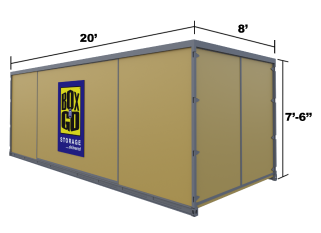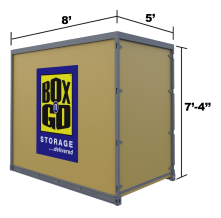Self Storage Brokers Near Me: A Complete Guide

The thought of buying or selling a self-storage facility is exciting, but it also comes with a long list of complex tasks. From financial analysis and property valuation to marketing and intense negotiations, handling it all on your own is a monumental undertaking. Many investors begin their journey with a search for “self storage brokers near me,” but quickly realize that finding the right fit is the most critical decision they’ll make. A specialized broker does more than just list a property; they provide access to off-market deals, save you countless hours, and act as your professional advocate, ensuring you get the best possible outcome.
Box-n-Go Portable Storage Unit Sizes









Key Takeaways
- Partner with a specialized broker for a strategic advantage: They do more than just manage the sale; they provide expert market analysis, accurate property valuations, and skilled negotiation to get you the best possible deal.
- Vet potential brokers carefully: Look for proven experience specifically in self-storage, deep knowledge of your local market, and positive references from past clients to ensure you’re hiring a true specialist.
- Be an active and prepared partner: You can streamline the process by clearly defining your goals, gathering all necessary financial documents upfront, and agreeing on a communication plan with your broker.

What Does a Self-Storage Broker Actually Do?
Think of a self-storage broker as your expert guide in the world of storage properties. They do more than just connect buyers and sellers; they are specialists who live and breathe the self-storage market. Whether you’re looking to buy your first facility, sell a long-held property, or expand your investment portfolio, a broker is the professional you want in your corner. Their job is to manage the entire process, from initial market research and property valuation all the way through the complex negotiations and final paperwork. They bring industry-specific knowledge that a general real estate agent simply won’t have, helping you make smarter decisions and avoid costly mistakes.
Analyze the Market
A great broker starts by digging deep into the market. They go beyond just looking at what’s for sale and analyze everything from local population growth and traffic patterns to the performance of competing storage facilities in the area. For sellers, this means they know exactly how to position your property to attract the right buyers. A full-service broker will market a self-storage property through a variety of channels to ensure it gets maximum exposure. For buyers, this analysis uncovers hidden gems and flags properties that might not be a good fit for your goals, giving you a clear picture of your potential investment.
Value Storage Properties
Figuring out what a self-storage facility is actually worth is a complex process, and a broker’s expertise here is invaluable. They don’t just pull a number out of thin air; they conduct a detailed financial analysis based on occupancy rates, revenue streams, operating expenses, and potential for growth. Your broker knows how to evaluate your property based on current industry standards, giving you a realistic and reliable assessment of its value. This ensures that as a seller, you’re asking for a fair price, and as a buyer, you’re not overpaying for an asset. Their objective valuation is a cornerstone of any successful transaction.
Store on your driveway or inside our secure facility. Load/unload only once. Ground level access.
We Deliver
We Pick Up
We Store or Move
Advise on Investments
Beyond just the property itself, a broker acts as a strategic advisor. They help you see the bigger picture of your investment. For sellers, a broker can provide an entire network of vetted buyers known for closing deals, which makes the sales process much more efficient. For buyers, they can help you understand the potential return on investment and how a particular property aligns with your long-term financial goals. This expert guidance is key to making smart decisions and building a successful portfolio over time.
Manage the Transaction
Once a deal is in motion, a broker shifts into the role of a project manager. They are the central point of contact, coordinating everything between the buyer, seller, attorneys, lenders, and inspectors. This is where their value really shines, especially for anyone who values their time and wants to avoid headaches. A broker will guide you through every step, from the initial offer to the due diligence period and the final closing. They manage the transaction to ensure all deadlines are met and the paperwork is handled correctly, keeping the process smooth and on track so you can focus on your business.
Handle Negotiations
Negotiation is one of the most critical—and often stressful—parts of any real estate deal. A skilled broker acts as your advocate, using their market knowledge and experience to negotiate the best possible price and terms on your behalf. They handle the back-and-forth communication, removing the emotion from the process and focusing on achieving your objectives. While brokerage fees are part of the equation, they are often negotiable. A top-notch negotiator can often save or earn you far more than their commission, making their service a worthwhile investment in securing a favorable outcome for your deal.
How to Find a Great Storage Broker
Finding the right storage broker is a lot like finding any trusted professional—it requires a little homework, but the payoff is huge. A great broker does more than just manage a transaction; they become your guide in the self-storage market. They bring deep industry knowledge and a network of contacts that you simply can’t access on your own. Taking the time to find a good match will make the entire process smoother and more successful. The key is to know where to look and what to look for. These straightforward steps will help you find a fantastic partner for your storage venture.
20’ Container – all weather. 16’ Container – all weather. 8’ Container – all weather.
Perfect for 3-bedroom residence.
5-7 rooms, furniture, appliances, etc.
Perfect for 2-bedroom residence.
3-5 rooms, furniture, appliances, etc.
Modular – works for any need.
Each fits 1-1.5 rooms.
Start With an Online Search
Your search can begin right from your computer. A simple online search is a great first step to get a lay of the land and identify the major players in your area. Look for firms that specialize specifically in self-storage, as they will have the most relevant experience. Companies like Marcus & Millichap, for example, focus on this niche and provide detailed reports and listings. This allows you to see who is active in your market and gain valuable local market knowledge before you even make a phone call. Pay attention to the brokers who consistently represent properties in your target region.

![]()
Check Industry Directories
Once you have a few names, check them against industry directories. Think of these as a curated list of pre-vetted professionals. These directories are maintained by established organizations and are a reliable way to verify a broker’s credibility. For instance, Argus Self Storage Advisors is known as a premier brokerage firm in the storage world and maintains a comprehensive list of affiliated brokers across the country. Using a directory helps you cut through the noise and focus on brokers who are recognized leaders in the self-storage sector, ensuring you connect with experienced and reputable experts.
Tap Into Local Real Estate Networks
Don’t underestimate the power of local connections. Engaging with general real estate networks in your area can provide incredible on-the-ground insights. Local agents and investors often have a pulse on the market and can refer you to the best storage specialists. Firms like Matthews™ Real Estate Investment Services have dedicated self-storage divisions and can connect you with knowledgeable agents who truly understand the specific dynamics of the local market. This approach helps you find someone who not only knows storage but also knows the unique opportunities and challenges of your specific city or region.
Read Reviews and Ratings
Before you commit, take a few minutes to see what past clients have to say. Just as you’d read reviews for a new restaurant, checking a broker’s ratings can give you a clear picture of their professionalism and effectiveness. While you might not find a broker on every review site, platforms like Yelp can be a good resource for finding feedback on top-rated self-storage units and the companies that represent them. This feedback can give you a sense of their reputation and the level of customer satisfaction they provide, helping you avoid potential headaches down the road.
Ask for Professional Referrals
Finally, one of the most effective methods is to ask for a referral from other professionals you trust. If you have connections in banking, law, or commercial real estate, ask them who they recommend for self-storage transactions. A personal recommendation from a respected source is often the most reliable indicator of a broker’s quality and integrity. A referred broker has a reputation to uphold, which means they are more likely to provide excellent service. Understanding the benefits of hiring a self-storage broker can also help you frame your request and know what to expect from their guidance.

![]()
Why You Should Partner With a Storage Broker
Deciding to buy or sell a self-storage facility is a major financial move. While you could technically go it alone, partnering with a specialized storage broker can make the entire process smoother and more profitable. Think of them as your expert guide, handling the complexities so you can focus on the big picture. From uncovering hidden opportunities to managing tedious paperwork, a great broker brings immense value to the table. If you value your time and want to get the best possible outcome, working with a professional is one of the smartest decisions you can make.
Get Access to Off-Market Deals
Some of the best investment opportunities are never publicly listed. These “off-market” deals are shared within tight-knit professional circles. When you partner with a well-connected broker, you gain access to their network of vetted buyers and sellers. This gives you a first look at exclusive properties you would have otherwise missed. A broker’s connections can usher you into a sales process filled with these unique, off-market opportunities, giving you a significant edge over the competition. It’s like having a backstage pass to the best deals in the industry, allowing you to find the perfect match for your investment goals without fighting the crowds.

![]()
Benefit from Professional Negotiation
Negotiating the terms of a multi-million dollar deal can be incredibly stressful, especially if you’re not used to it. An experienced self-storage broker is a skilled negotiator who advocates for your best interests. They know the market inside and out, understand standard contract terms, and can skillfully handle the back-and-forth to secure the best possible price and conditions for your transaction. Their expertise removes the emotion from the process and ensures you don’t leave money on the table or agree to unfavorable terms. This professional buffer is invaluable for achieving a successful and profitable outcome.
Save Valuable Time
Let’s be honest: your time is your most valuable asset. Buying or selling a storage facility involves countless hours of research, marketing, communication, and administrative tasks. By hiring a self-storage broker, you delegate all that heavy lifting. They handle the time-consuming work of finding properties, vetting buyers, scheduling showings, and managing communications. This frees you up to concentrate on the other important parts of your business or personal life. Instead of getting bogged down in the details, you can stay focused on your strategy while your broker manages the day-to-day process efficiently.
Receive Expert Market Guidance
The self-storage market is constantly changing. A top broker has their finger on the pulse of current trends, property values, and investment activity in your specific area. They provide you with expert insights that help you make informed decisions, whether you’re buying or selling. A full-service broker will also market a self-storage property through a variety of channels, ensuring your facility gets maximum exposure. This expert guidance is crucial for accurately pricing a property, identifying strong investment opportunities, and positioning yourself for success in any market condition.

![]()
Minimize Your Risk
Every major transaction comes with potential risks, from legal liabilities to financial pitfalls. A knowledgeable broker helps you sidestep the potential pitfalls throughout the transaction process, significantly reducing your exposure. They are trained to spot red flags in contracts, due diligence documents, and property inspections that you might overlook. Their experience ensures that all legal and regulatory requirements are met, protecting you from costly mistakes and future complications. Having an expert in your corner provides peace of mind and a critical layer of security for your investment.
Let Them Handle the Paperwork
The sheer volume of paperwork involved in a real estate transaction can be overwhelming. From letters of intent and purchase agreements to due diligence checklists and closing documents, there’s a mountain of forms to handle. Your broker takes charge of all of it. They know how to prepare and evaluate documents based on industry standards and will manage the entire paper trail from start to finish. This ensures everything is filled out correctly and submitted on time, preventing delays and ensuring a smooth, compliant closing process. You can rest easy knowing a professional is managing the details with precision.

![]()
Key Qualities of a Top Storage Broker
Finding the right broker is about more than just picking a name from a list. You’re looking for a partner who can guide you through a complex transaction with skill and confidence. When you start interviewing potential candidates, keep an eye out for these essential qualities. They separate the average brokers from the truly great ones and can make all the difference in your final outcome.
Proven Industry Experience
You want a specialist, not a generalist. A broker who deals with all types of commercial real estate might not grasp the specific details of the self-storage market. An experienced self-storage broker understands everything from unit mix and occupancy rates to the latest management software. They live and breathe this industry and can provide an accurate valuation of your property based on its unique characteristics. They know what buyers in this niche are looking for and how to position your facility to attract the best offers, ensuring you have a clear path to sealing the deal.

![]()
Deep Local Market Knowledge
Real estate is, and always will be, a local game. A top broker has their finger on the pulse of the community your facility serves. They should be able to speak confidently about local demographic shifts, new development projects, and the competitive landscape. This in-depth local market knowledge is crucial for pricing your property correctly and marketing it to the right people. Ask them about recent sales in the area and what made those deals successful. Their answers will quickly show you whether they have the on-the-ground expertise you need.
The Right Credentials
Credentials aren’t just fancy acronyms after a name; they’re a sign of professionalism and commitment to the industry. Look for brokers who are members of respected trade groups like the Self Storage Association (SSA). Affiliation with a self-storage membership organization like Storelocal is another great sign, as it shows they are connected and actively involved in the industry. These memberships often provide brokers with access to a larger network of buyers and sellers, ongoing education, and valuable market data, all of which directly benefit you as their client.
A Communication Style That Works for You
This is a partnership, and like any good relationship, communication is key. Before you sign anything, have a frank conversation about how you’ll stay in touch. Do you prefer weekly summary emails, or do you want a quick text after every showing? A great broker will adapt to your preferences and keep you in the loop. They should also be able to clearly explain how they plan to market a self-storage property, from online listings to direct outreach. You should always feel informed, not like you’re chasing them down for updates.
A Strong Track Record
Let the numbers do the talking. A broker’s past performance is one of the best predictors of their future success. Don’t hesitate to ask for their track record, including a list of properties they’ve recently sold, the sale prices, and how long they were on the market. A broker with a history of success can provide access to a network of vetted buyers known for closing deals. This experience translates into a more efficient and effective sales process for you, minimizing stress and maximizing your return.

![]()
Solid Client References
This is your chance to get the real story. A confident broker will be happy to provide you with a list of recent clients you can contact for references. Speaking with people who have been in your exact position is one of the most valuable steps you can take. Ask them about their experience—what went well, what they would have done differently, and whether they’d work with the broker again. This firsthand insight is priceless when you’re deciding who to trust with your significant investment. It confirms you’re not just hiring a self-storage broker but partnering with the right one.
How Are Storage Brokers Paid?
Understanding how your broker is compensated is key to a transparent and healthy partnership. When everyone is clear on the financials from day one, you can focus on what really matters: closing a great deal that meets your goals. There should be no surprises when it comes to payment, so let’s walk through the typical structures you’ll encounter when working with a self-storage broker.

![]()
Common Commission Structures
The most common way storage brokers are paid is through a commission, which is a percentage of the property’s final sale price. Think of it as their success fee—they only get paid if they successfully sell your property. These brokerage fees are always negotiable but generally hover around 5% to 6% for a single property. For larger properties or a portfolio of multiple facilities, that percentage might be lower. This is one of the first things you should discuss with a potential broker. A good broker will be upfront about their commission structure and what it includes, ensuring you’re both on the same page before signing any agreements.
Potential Additional Fees
While a straight commission is standard, you should always ask about any other potential costs. Some brokerage firms may charge separate fees for things like marketing expenses, professional photography, or administrative services. These aren’t always part of the deal, but it’s better to ask than to be surprised by an unexpected item on your closing statement. Before you commit, request a full breakdown of all potential charges. This ensures complete transparency and helps you accurately calculate your net proceeds from the sale. Any additional fees should be clearly itemized and explained in your listing agreement.
Typical Payment Terms
So, when does the broker actually get paid? In nearly all cases, the commission is paid at the closing of the transaction. The fee is typically deducted from the seller’s proceeds by the title or escrow company and paid directly to the brokerage. This structure is great for you as a seller because it aligns your broker’s motivation with your own. They are financially invested in securing the best possible deal and seeing it through to a successful closing. While very rare, some brokers may ask for a small upfront retainer for specialized services, but for most property sales, payment happens at the finish line.

![]()
What to Expect in the Contract
Everything we’ve discussed comes together in the listing agreement—the formal contract between you and your broker. This document makes your partnership official and outlines everyone’s responsibilities. Before you sign, carefully review it to confirm the exact commission percentage, a list of any additional fees, and the payment terms. The contract will also specify the duration of the agreement and whether it’s an “exclusive right to sell” arrangement, which is common. This legal document is what empowers your broker to market your property and connect you with qualified buyers, so make sure you understand and agree with every clause.
Top Self-Storage Broker Networks to Know
When you start your search for a broker, you’ll quickly notice a few big names that come up again and again. These national and global networks have dedicated self-storage divisions staffed with experts who live and breathe this industry. While working with a local, independent broker has its perks, partnering with one of these powerhouses gives you access to a massive pool of resources, data, and connections. Here are some of the top players you should know.
Marcus & Millichap
If you’re looking for a firm that truly specializes in self-storage, Marcus & Millichap is a name you’ll want to know. They aren’t just a general commercial real estate firm that happens to do storage deals; they have a dedicated division with deep, property-specific expertise. This means their brokers understand the unique details of operating a storage facility, from unit mix to occupancy rates. They offer comprehensive investment sales and advisory services, making them a valuable resource whether you’re buying your first property or expanding your portfolio. Their extensive local market knowledge helps you find opportunities that others might miss.
CBRE
As one of the largest commercial real estate firms in the world, CBRE brings a ton of resources to the table. Their sheer size means they have access to an incredible amount of market research and data. Their self-storage team puts this to good use, leveraging powerful analytics to help you make smart, informed investment decisions. If you’re someone who values a data-driven approach and wants to see the numbers behind a recommendation, CBRE is a fantastic choice. They provide a full range of real estate services, from sales to property management, giving you a one-stop shop for your investment needs.
Cushman & Wakefield
Cushman & Wakefield is another global leader known for its strategic, insightful approach. Their self-storage advisory team has a reputation for helping clients work through the more complex parts of an investment. If you’re feeling a bit overwhelmed by the financial modeling or due diligence process, their team can provide the guidance you need. They pride themselves on offering deep market insights, which means they go beyond surface-level data to give you a clear picture of a property’s true potential and risks. This strategic partnership can be invaluable for handling the competitive self-storage market.
Argus Self Storage Advisors
Unlike the larger, more diversified firms, Argus Self Storage Advisors does one thing, and they do it exceptionally well: self-storage. Their entire business is built around this specific niche, which gives them an unparalleled level of focus and expertise. Because they deal exclusively in self-storage, their brokers have an in-depth understanding of the industry’s trends and challenges. They are widely recognized for their commitment to client success and have built a reputation as a trusted partner for investors. If you want a team that is 100% dedicated to your world, Argus is a top contender.
SVN Commercial Real Estate
SVN Commercial Real Estate offers a unique approach that sets them apart from many other firms. Their platform is built on transparency and collaboration, which directly benefits you as the client. Instead of keeping listings in-house, SVN brokers are encouraged to share information and cooperate with other brokers—even those at competing firms. This means your property gets maximum exposure if you’re selling, and you get access to a wider range of deals if you’re buying. This collaborative spirit fosters a more open and efficient process, tapping into a broad network of professionals across the self-storage industry.
Colliers International
Colliers International is a global powerhouse that combines worldwide reach with a personal touch. Their team of experts is skilled at using detailed market research and analytics to create solutions tailored specifically to your goals. They understand that every investor is different—what works for a large REIT won’t be the right fit for a first-time buyer. By digging into the data, they can help you identify the right properties and craft a strategy that aligns with your budget and long-term vision. This customized approach ensures you’re not just getting generic advice, but a plan designed for your success.
JLL
JLL (Jones Lang LaSalle) is a top-tier firm that specializes in both real estate and investment management, making them a strong choice for investors with a long-term vision. Their self-storage advisory team excels at providing strategic insights that go beyond a single transaction. They help clients optimize their investments over time and successfully adapt to changing market trends. If you’re looking to build a resilient portfolio and want a partner who can offer sophisticated market analysis and forward-thinking advice, JLL’s expertise in investment strategy is a significant advantage. They can help you see the bigger picture and position your assets for sustained growth.
How to Work Effectively With Your Broker
Once you’ve chosen a broker, the work isn’t over. A great partnership is a two-way street. To get the best possible outcome, you need to be an active, prepared, and communicative partner. Think of your broker as your project manager and most valuable team member for the sale. By setting a strong foundation and staying aligned throughout the process, you can make the journey to a successful closing feel efficient and straightforward. Here’s how to build a great working relationship with your broker from day one.
Set Clear Goals from the Start
Before your broker can map out a strategy, they need to know the destination. Are you aiming for the highest possible price, even if it takes longer? Or is a quick, clean sale your top priority? Be upfront about your objectives. A broker’s job is to provide a valuation of your property and connect you with qualified buyers, but they can do this most effectively when they understand your personal definition of a win. By setting clear goals together, you give them a target to aim for and create a shared vision for the entire transaction. This initial conversation is the most important one you’ll have, as it shapes every decision that follows.
Prepare the Necessary Documents
You can significantly speed up the sale by having your paperwork in order before you even start. While your broker will handle the complexities of legal issues, surveys, and financing documentation, coming to the table prepared makes their job much easier. Gather your property’s financial statements for the last few years, existing tenant leases, maintenance records, and any recent appraisals. Having these items ready helps your broker build a compelling case for buyers and ensures the due diligence period goes smoothly. Using a commercial real estate pre-sale checklist can be a great way to get organized and make sure you haven’t missed anything important.
Establish Communication Expectations
Miscommunication can cause unnecessary stress and delays. From the very beginning, have a frank conversation with your broker about how you’ll stay in touch. Do you prefer a weekly summary email or a quick phone call for important updates? How quickly should you expect a response? A broker with a strong team has a network of vetted buyers ready to go, and clear communication helps them manage that network to create an efficient sales process. Agreeing on a communication plan ensures you’re always in the loop without feeling overwhelmed or left in the dark. This simple step builds trust and keeps the momentum going in the right direction.
Agree on a Timeline
Selling a commercial property takes time, and it’s important to have realistic expectations. Work with your broker to establish a target timeline for the entire process, from listing the property to the final closing date. This timeline should include key milestones, such as the marketing period, offer reviews, and the due diligence phase. Establishing a timeline helps manage expectations for everyone involved and provides a framework for the sale. It also creates a natural point to discuss how negotiable brokerage fees and other costs align with the projected schedule, so there are no surprises down the road.
Define What Success Looks Like
While the final sale price is a huge part of the equation, it’s not the only measure of a great deal. Success can also mean finding a reliable buyer who will close without issues, negotiating favorable terms, or ensuring a smooth transition post-sale. Your broker knows how to evaluate your property based on industry standards and can give you a reliable assessment of its value. Use their expertise to get a clear picture of what a successful outcome looks like in the current market, and then align that with your personal goals for the sale. This ensures you and your broker are working toward the same finish line.
Your Action Plan for a Successful Partnership
Finding the right broker is just the first step. To make the most of this relationship, you need a clear plan. A successful partnership is built on preparation, clear communication, and mutual understanding. When you and your broker are on the same page, you create a powerful team that can effectively achieve your buying or selling goals. This proactive approach ensures a smoother process and helps you get the best possible outcome.
How to Prepare for Your First Meeting
Walking into your first meeting prepared will set the tone for your entire partnership. Your goal is to show the broker you’re serious and to give them the information they need to get started. Before you meet, spend some time defining what a successful deal looks like for you. Are you looking to buy your first property, sell an existing one, or expand your portfolio? Have a clear budget or desired sale price in mind. A top-tier broker will handle the heavy lifting—from legal issues to financing—but they need your vision as a starting point. Come with your goals written down and be ready to discuss your timeline and financial capacity.
Your Essential Document Checklist
To hit the ground running, your broker will need some key documents. Having these ready demonstrates your organization and allows the broker to work more efficiently. If you’re selling, a broker can provide a professional property valuation and start connecting you with qualified buyers, but they need your data to do it accurately.
Gather these items ahead of time:
- Financial Records: At least three years of profit and loss statements and current rent rolls.
- Property Details: The physical address, unit mix, occupancy history, and a list of any recent capital improvements.
- Existing Agreements: Copies of any management contracts or significant vendor agreements.
- Photos: High-quality images of the property, including units, offices, and security features.
Key Questions to Ask a Potential Broker
This is your interview. You’re hiring a professional for a critical role, so don’t be shy about asking direct questions. Their answers will reveal their experience, strategy, and whether their communication style fits yours. You want to understand exactly how they operate and what you can expect.
Be sure to ask:
- How many self-storage transactions have you closed in the last year?
- What is your marketing strategy for a property like mine?
- How do you communicate with clients, and how often can I expect updates?
- What are your commission rates and fees?
Remember that brokerage fees are often negotiable. They typically range from 5% to 6%, but can be lower for larger properties or portfolios.
Red Flags to Watch Out For
Just as important as knowing what to look for is knowing what to avoid. A few warning signs can help you steer clear of a partnership that won’t serve you well. Be wary of brokers who seem disorganized, are poor communicators, or use high-pressure sales tactics. Another major red flag is a broker who resists a broad marketing plan. Some brokers may claim that mass marketing is an unnecessary cost or hassle, but a comprehensive strategy is what creates competition and drives the best price. A broker who wants to cut corners on marketing may not be fully committed to getting you the best possible deal.
How to Follow Up After the Deal Is Done
Once the transaction is complete, the relationship doesn’t have to end. A great broker can be a valuable long-term partner for future investments. After the deal closes, schedule a final call to debrief. Discuss what went well and what could be improved next time. Ask for a complete file of all transaction documents for your records. Since your broker is an expert at evaluating property based on industry standards, you can also ask for a final report summarizing the deal and market conditions. Staying in touch ensures you have a trusted advisor ready for your next move in the self-storage market.
Frequently Asked Questions
Do I really need a self-storage broker, or can any commercial real estate agent help me? While any licensed agent can legally handle the transaction, a self-storage specialist brings a level of industry knowledge that is critical for this unique asset class. They understand the specific business metrics that determine a facility’s true value, like unit mix, occupancy trends, and operational software. A general commercial agent might value your property like an office building or warehouse, potentially leaving a lot of money on the table or misjudging a potential purchase.
Is the broker’s commission fee set in stone? Think of the commission as a starting point for a conversation. While there are industry standards, the final percentage is almost always negotiable. The rate can depend on several factors, such as the value of your property, whether you’re selling a single facility or a larger portfolio, and the complexity of the deal. A good broker will be transparent about their fees and the immense value they bring, ensuring you feel the partnership is fair and worthwhile.
What’s the biggest mistake people make when working with a broker? The most common pitfall is a lack of clear communication about goals from the very beginning. A broker can’t read your mind. If you don’t clearly state whether your top priority is getting the absolute highest price or achieving a quick, hassle-free sale, they might pursue a strategy that doesn’t align with what you truly want. Being upfront about your definition of success is the foundation of a great partnership.
How much work do I actually have to do if I hire a broker? Your broker handles the heavy lifting—the marketing, the negotiations, the endless paperwork, and coordinating with all the parties involved. Your role shifts to being the key decision-maker and information provider. Your main responsibilities are to provide all the necessary financial and property documents upfront and to be available to answer questions and make clear decisions when offers come in. This allows the broker to work efficiently on your behalf.
Can a broker help me find properties that aren’t even listed for sale? Absolutely, and this is one of their greatest advantages. The best brokers have deep networks and are constantly talking to facility owners in their market. They often know who is considering selling long before a property is ever publicly listed. Partnering with a well-connected broker gives you exclusive access to these off-market opportunities, which often represent some of the best deals available.

